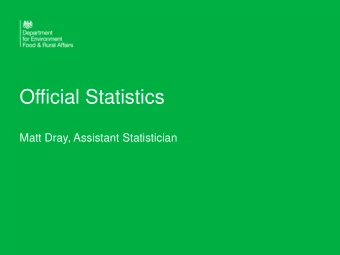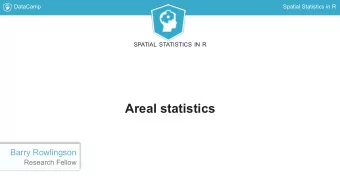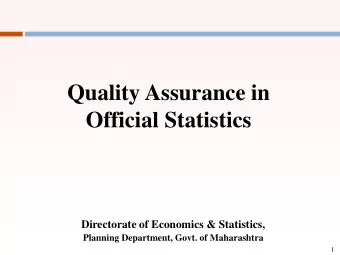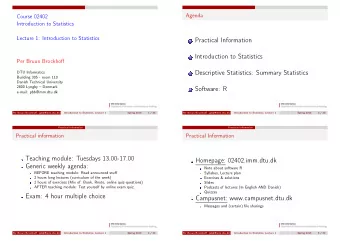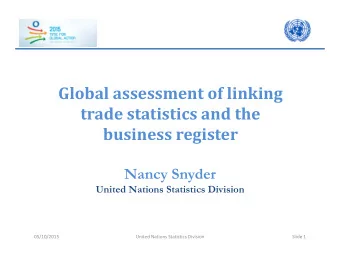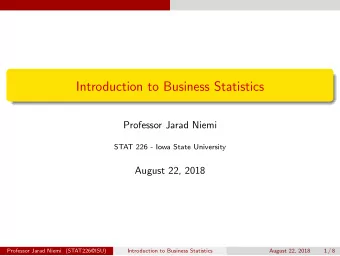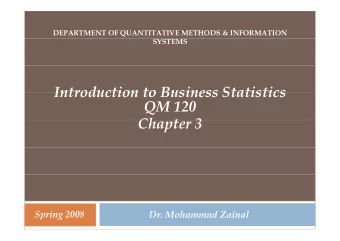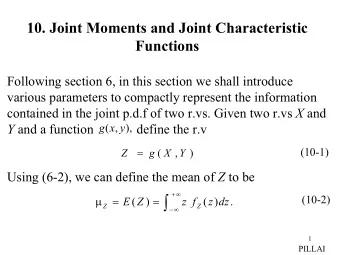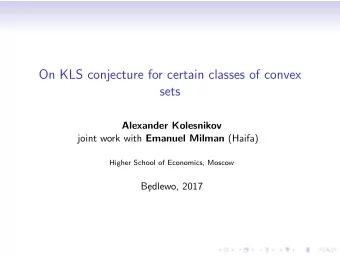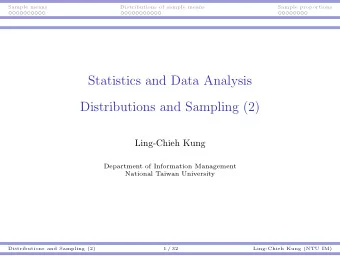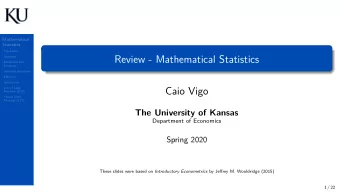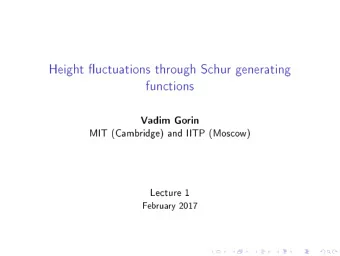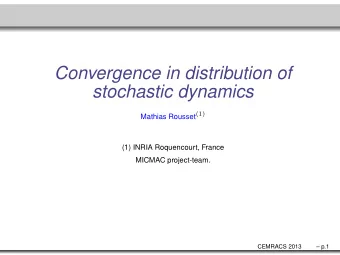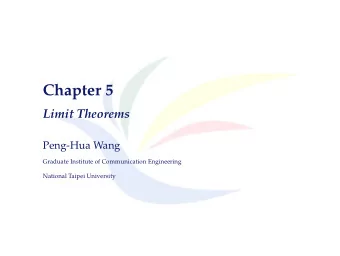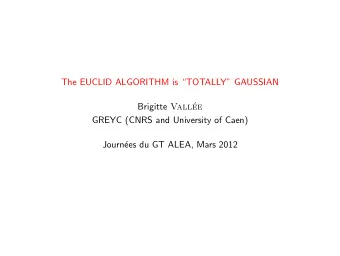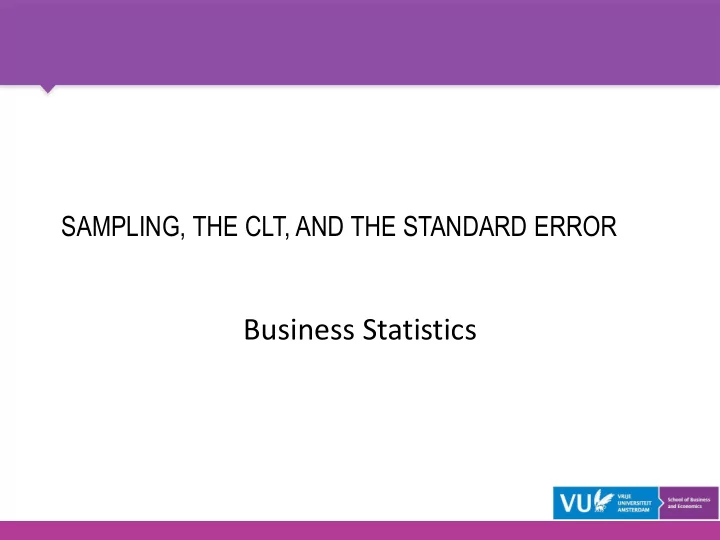
Business Statistics CONTENTS Sampling The central limit theorem - PowerPoint PPT Presentation
SAMPLING, THE CLT, AND THE STANDARD ERROR Business Statistics CONTENTS Sampling The central limit theorem Point and interval estimates for Confidence intervals for Old exam question Further study SAMPLING Suppose youre a
SAMPLING, THE CLT, AND THE STANDARD ERROR Business Statistics
CONTENTS Sampling The central limit theorem Point and interval estimates for 𝜈 Confidence intervals for 𝜈 Old exam question Further study
SAMPLING Suppose you’re a scissors manufacturer in the UK ▪ What proportion of your production should be left-handed? ▪ Three strategies ▪ look at Wikipedia (“ Studies suggest that 70 – 90% of the world population is right-handed.[4][5] ”) ▪ ask all persons in the UK (~63 million) ▪ ask a sample of persons (100?) in the UK
SAMPLING Sampling is the process of collecting data about a sample (a subset of the population), with the aim of representing the entire population ▪ Arguments pro sampling ▪ too costly to probe entire population ▪ too time-consuming ▪ too dangerous ▪ too destructive ▪ etc. ▪ Arguments against sampling ▪ limited accuracy confidence intervals (later in this course) ▪ not representative design of experiments (not in this course)
SAMPLING A sample should be representative ▪ e.g., don’t ask people at Schiphol if they’re afraid of flying A sample should be large enough ▪ cf. the “ 𝑜 ” law later on Choice in sampling ▪ with replacement or without replacement ▪ this has consequences for the probability model
SAMPLING Population Sample unknown known we would like to know irrelevant parameter statistic mostly Greek letters ( 𝜌 , 𝜏 ) mostly Roman letters ( 𝑞 , 𝑡 ) some deviating notations ( 𝑂 ) some deviating notations ( ҧ 𝑦 , 𝑜 )
THE CENTRAL LIMIT THEOREM ▪ Let 𝑌 1 , 𝑌 2 , … , 𝑌 𝑜 be a random sample from a population 2 𝑌 with mean 𝜈 𝑌 and variance 𝜏 𝑌 ▪ e.g., body heights of 𝑜 persons Capital 𝑌 , because it is a ▪ waiting times of 𝑜 customers random variable! ▪ failure rates of 𝑜 cars, ... 𝑌 1 +𝑌 2 +⋯+𝑌 𝑜 ▪ Then, for 𝑜 sufficiently large, the mean ത 𝑌 = 𝑜 1. is normally distributed 2. with mean 𝜈 ത 𝑌 = 𝜈 𝑌 2 2 = 𝜏 𝑌 3. and variance 𝜏 ത Capital ത 𝑌 , because this is 𝑌 𝑜 also a random variable!
THE CENTRAL LIMIT THEOREM So for large 𝑜 : 2 2 = 𝜏 𝑌 ത 𝑌~𝑂 𝜈 ത 𝑌 = 𝜈 𝑌 , 𝜏 ത 𝑌 𝑜 ▪ or for short 2 𝑌~𝑂 𝜈 𝑌 , 𝜏 𝑌 ത 𝑜 ▪ This holds regardless of the distribution of 𝑌 ! ▪ so that’s why the normal distribution is called “normal” ▪ this fact is called the central limit theorem (CLT) ▪ it is one of the most important results of statistics ▪ it holds for “sufficiently large” 𝑜
THE CENTRAL LIMIT THEOREM The CLT for a fair die Distribution of ത 𝑌 for ▪ 𝑜 = 1 ▪ 𝑜 = 2 ▪ 𝑜 = 5 ▪ 𝑜 = 20
THE CENTRAL LIMIT THEOREM The CLT for a loaded (unfair) die Distribution of ത 𝑌 for ▪ 𝑜 = 1 ▪ 𝑜 = 2 ▪ 𝑜 = 5 ▪ 𝑜 = 20
EXERCISE 1 We roll with a die 100 times. The outcomes are 𝑌 = 𝑌 1 , 𝑌 2 , … , 𝑌 100 . How is ത 𝑌 distributed?
THE CENTRAL LIMIT THEOREM A “proof” of the theorem (for normal populations) ▪ Recall the additive property of the normal distribution: 2 and 𝑌 2 ~𝑂 𝜈 𝑌 , 𝜏 𝑌 2 , then 𝑌 1 + ▪ if 𝑌 1 ~𝑂 𝜈 𝑌 , 𝜏 𝑌 2 (provided 𝑌 1 and 𝑌 2 are independent) 𝑌 2 ~𝑂 2𝜈 𝑌 , 2𝜏 𝑌 2 then 𝑏𝑌~𝑂 𝑏𝜈 𝑌 , 𝑏 2 𝜏 𝑌 2 ▪ Also recal that if 𝑌~𝑂 𝜈 𝑌 , 𝜏 𝑌 2 2 then 𝑌 1 +𝑌 2 𝜏 𝑌 ▪ So, if 𝑌 1 + 𝑌 2 ~𝑂 2𝜈 𝑌 , 2𝜏 𝑌 ~𝑂 𝜈 𝑌 , 2 2 2 𝑌 1 +⋯+𝑌 𝑜 𝜏 𝑌 ▪ and more general: ~𝑂 𝜈 𝑌 , 𝑜 𝑜 You don’t need to reproduce 2 𝜏 𝑌 ▪ or equivalently: ത such proofs, but it may help 𝑌~𝑂 𝜈 𝑌 , 𝑜 ▪ This proof works for normal populations and all 𝑜 , but the CLT is valid for all populations and “large” 𝑜
THE CENTRAL LIMIT THEOREM Some consequences of the CLT ▪ ത 𝑌 is an estimator of 𝜈 𝑌 ▪ and ҧ 𝑦 is the best estimate of 𝜈 𝑌 ▪ ത 𝑌 will be a better estimator for large 𝑜 ▪ because 𝜏 ത 𝑌 decreases with 𝑜 ▪ we can use the distribution of ത 𝑌 to construct a confidence interval for 𝜈
THE CENTRAL LIMIT THEOREM The CLT holds for 𝑜 “sufficiently” large ▪ More specifically: ▪ if 𝑌 is normally distributed, the CLT holds for all sample sizes 𝑜 ▪ if the distribution of 𝑌 is fairly symmetric without extreme outliers, for sample sizes 𝑜 ≥ 15 the CLT gives a pretty good approximation of the distribution of ത 𝑌 ▪ for any distribution of ത 𝑌 and a sample size 𝑜 ≥ 30 , the CLT gives a pretty good approximation of the distribution of ത 𝑌
THE CENTRAL LIMIT THEOREM The effect of asymmetry vs. sample size
POINT AND INTERVAL ESTIMATES FOR 𝜈 A statistic is a function of the (randomly sampled) data ▪ important example: the statistic ത 𝑌 1 ▪ defined by ത 𝑜 𝑜 σ 𝑗=1 𝑌 = 𝑌 𝑗 1 𝑜 ▪ in a concrete case, ҧ 𝑦 𝑗 is the best possible 𝑜 σ 𝑗=1 𝑦 = estimate of the parameter 𝜈 ▪ so the sample mean ҧ 𝑦 is the best possible estimate of the population mean 𝜈 ▪ because it is just one value, it is a point estimate
ҧ POINT AND INTERVAL ESTIMATES FOR 𝜈 Due to sampling variation, ҧ 𝑦 will be different in each sample ▪ and there will be a distribution of ҧ 𝑦 -values, the distribution ത 𝑌 ▪ the true value of 𝜈 may be different from the value of 𝑦 obtained ▪ however, keep in mind that the value of ҧ 𝑦 obtained cannot be “too” wrong 2 , so it follows that a specific ▪ we know that ത 𝑌~𝑂 𝜈 ത 𝑌 , 𝜏 ത 𝑌 value ҧ 𝑦 must be within 𝜈 ത 𝑌 − 1.96𝜏 ത 𝑌 , 𝜈 ത 𝑌 + 1.96𝜏 ത 𝑌 with 95% probability
ҧ ҧ ҧ ҧ ҧ ҧ POINT AND INTERVAL ESTIMATES FOR 𝜈 Conversely, the population value 𝜈 ത 𝑌 must be within 𝑌 with 95% probability 𝑦 − 1.96𝜏 ത 𝑌 , 𝑦 + 1.96𝜏 ത ▪ and because 𝜈 ത 𝑌 = 𝜈 𝑌 , the population value 𝜈 𝑌 must be within 𝑌 with 95% probability 𝑦 − 1.96𝜏 ത 𝑌 , 𝑦 + 1.96𝜏 ത ▪ this is an interval estimate for 𝜈 𝑌 ▪ we say that 𝑌 is a 95% 𝑦 − 1.96𝜏 ത 𝑌 , 𝑦 + 1.96𝜏 ത confidence interval for 𝜈 𝑌
POINT AND INTERVAL ESTIMATES FOR 𝜈 So: ▪ we estimate 𝜈 𝑌 by ҧ 𝑦 ▪ and we know with 95% probability that ҧ 𝑦 − 1.96𝜏 ത 𝑌 ≤ 𝜈 𝑌 ≤ ҧ 𝑦 + 1.96𝜏 ത 𝑌 𝜏 𝑌 ▪ the quantity 𝜏 ത 𝑜 is the standard error of the 𝑌 = distribution of the mean ത 𝑌 ▪ it is so important that we give it a special name: the standard error of the mean ▪ sometimes (unfortunately!) abbreviated as the standard error
EXERCISE 2 We sample ( 𝑜 = 25 ) from a normal population 𝑌 with 2 = 4 . We find ҧ unknown 𝜈 𝑌 and known 𝜏 𝑌 𝑦 = 3 . a. Give a point estimate for 𝜈 𝑌 . b. Find the standard error of the mean, 𝑡 ത 𝑌 . b. Give a 95% -confidence interval for 𝜈 𝑌 .
ҧ CONCEPTS AND SYMBOLS ▪ Carefully distinguish: ▪ 𝜈 𝑌 (a value, often unknown) 𝑦 (a value from observations) ▪ 𝑌 (a distribution, not a value) ത ▪ 2 (both are values, often ▪ and its two parameters 𝜈 ത 𝑌 and 𝜏 ത 𝑌 unknown) ▪ Later on, we will follow a similar logic, e.g. 2 ▪ 𝜏 𝑌 2 ▪ 𝑡 𝑌 and the CLT claims that 2 𝜈 ത 𝑌 = 𝜈 𝑌 ▪ 𝑇 𝑌 2 2 = 𝜏 𝑌 ▪ and its two parameters 𝜏 ത 𝑌 𝑜
OLD EXAM QUESTION 23 March 2015, Q1h
FURTHER STUDY Doane & Seward 5/E 8.1-8.3 Tutorial exercises week 2 sampling distribution central limit theorem standard error
Recommend
More recommend
Explore More Topics
Stay informed with curated content and fresh updates.
